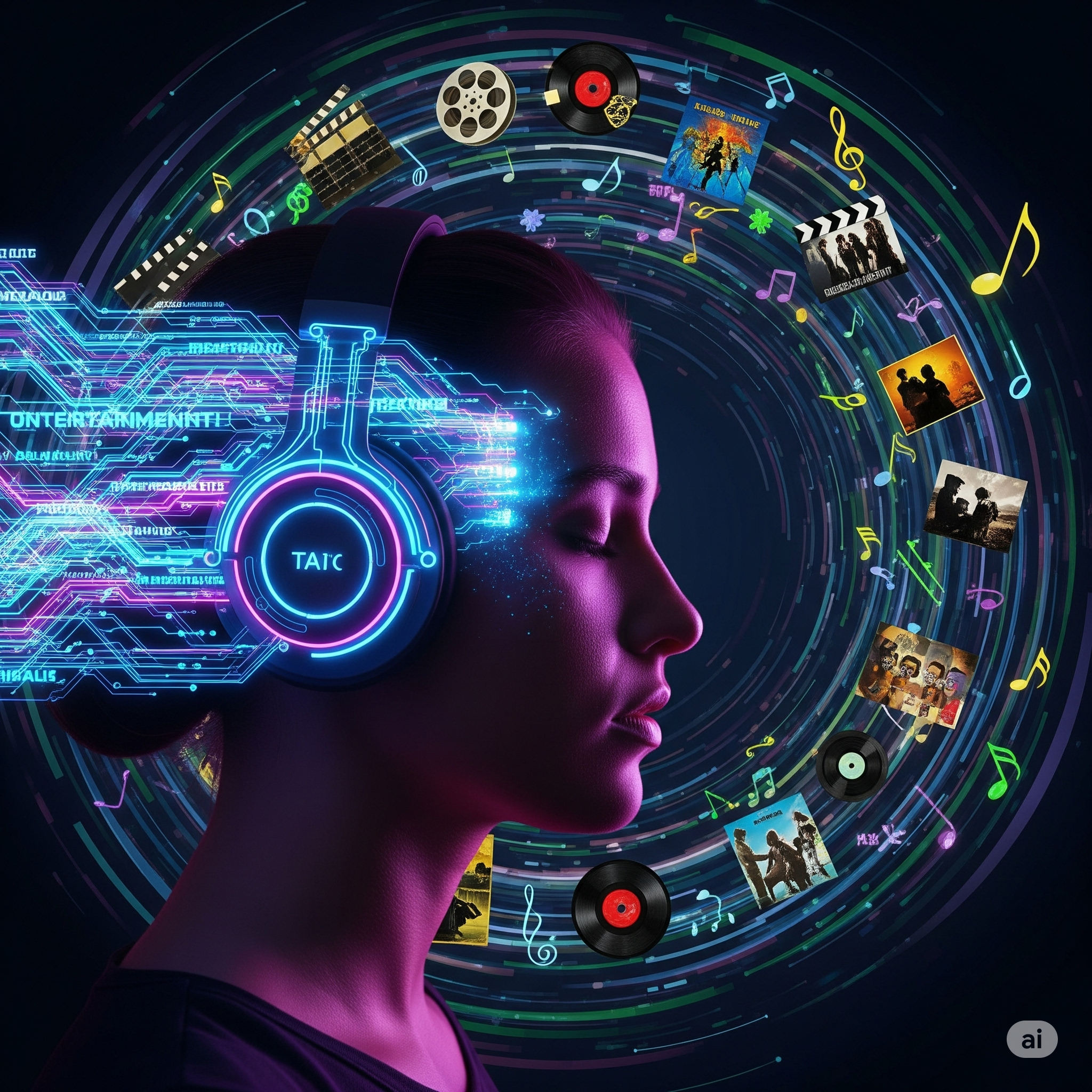The entertainment industry is constantly evolving, seeking new ways to captivate audiences and deliver experiences that resonate on a personal level. Artificial intelligence (AI) is emerging as a powerful force in this transformation, promising a future where movies and music are tailored to individual tastes like never before.
Imagine a streaming service that recommends films based not just on your watch history but also on your current mood, the time of day, or even the specific elements you enjoyed in a particular scene. Envision music playlists that adapt in real-time to your energy levels or discover new artists that perfectly align with your unique sonic preferences. This is the potential of AI in entertainment—a world of hyper-personalization that promises to redefine how we consume and interact with movies and music.
This article will explore the exciting ways AI is being used to personalize the entertainment experience, enhancing discovery, engagement, and ultimately, our enjoyment of films and songs.
Table of Contents
- AI-Powered Recommendation Systems: Beyond the Basics
- Personalized Movie Experiences: Tailoring Content to You
- Customized Music Journeys: Playlists Designed for Your Life
- AI in Content Creation: The Rise of Algorithmically Generated Entertainment
- Enhancing Discovery of Niche Content
- The Role of AI in Interactive Entertainment
- Ethical Considerations in Personalized Entertainment
- Conclusion: A Future of Entertainment Designed for You
- FAQ: Your Questions About AI in Personalized Entertainment Answered
AI-Powered Recommendation Systems: Beyond the Basics
Traditional recommendation systems often rely on collaborative filtering (suggesting what similar users liked) or content-based filtering (suggesting similar items to what you’ve consumed before). AI is taking these systems to a new level by incorporating a wider range of data and employing more sophisticated algorithms.
- Sentiment Analysis: AI can analyze reviews, social media posts, and even your reactions within a streaming interface to understand your emotional response to specific content, leading to more nuanced recommendations.
- Contextual Recommendations: AI can factor in contextual information like the time of day, your location (in a privacy-respecting way), and even your calendar to suggest entertainment that fits your current situation.
- Hybrid Approaches: The most effective recommendation systems often combine various AI techniques to provide a more comprehensive and personalized experience.
Personalized Movie Experiences: Tailoring Content to You
AI is enabling a future where your movie-watching experience is uniquely yours:
- Dynamic Storytelling (in early stages): While still in development, AI could potentially be used to alter plot points or character arcs in real-time based on audience engagement, creating a truly individualized viewing experience.
- Personalized Trailers and Marketing: AI can generate trailers and promotional materials tailored to your specific interests, highlighting the aspects of a film that are most likely to appeal to you.
- Enhanced Accessibility: AI-powered tools like automated subtitles and audio descriptions are making movies more accessible to a wider audience.
Customized Music Journeys: Playlists Designed for Your Life
The music industry has already seen a significant impact from AI in personalization:
- Smart Playlists: Platforms like Spotify and Apple Music use AI algorithms to create personalized playlists like “Discover Weekly” and “New Music Mix,” which introduce users to new music based on their listening habits.
- Adaptive Playlists: AI can create playlists that adapt to your current activity (e.g., workout mixes), mood, or even the tempo of your walking or running.
- AI-Powered Radio: Instead of static radio stations, AI can create dynamic radio experiences that continuously evolve based on your feedback and preferences.
AI in Content Creation: The Rise of Algorithmically Generated Entertainment
While human creativity remains central, AI is also making inroads into content creation itself:
- AI-Generated Music: AI tools can now compose original music in various styles, offering possibilities for personalized soundtracks or even entirely AI-generated musical artists.
- AI-Assisted Filmmaking (in development): AI is being explored for tasks like scriptwriting, storyboarding, and even generating visual content, potentially leading to more efficient and personalized film production in the future.
Enhancing Discovery of Niche Content
In a vast sea of entertainment options, AI can help users discover niche content that aligns with their unique interests, which might otherwise remain hidden.
- Deep Tagging and Categorization: AI can analyze movies and music with far greater granularity than traditional tagging, identifying subtle themes, moods, and styles that appeal to specific audiences.
- Connecting Like-Minded Viewers/Listeners: AI can help connect users with similar tastes, fostering communities around niche genres and artists.
The Role of AI in Interactive Entertainment
AI is also enhancing personalization in interactive forms of entertainment like video games:
- Adaptive Game Difficulty: AI can adjust the difficulty of a game in real-time based on a player’s skill level, ensuring a challenging but not frustrating experience.
- Personalized Game Worlds and Storylines: Advanced AI could potentially create game worlds and narratives that adapt to a player’s choices and play style, leading to truly unique gaming experiences.
- AI-Powered NPCs (Non-Player Characters): More sophisticated AI could lead to NPCs with more realistic behaviors and interactions, enhancing immersion and personalization.
Ethical Considerations in Personalized Entertainment
While personalization offers many benefits, it also raises ethical considerations:
- Filter Bubbles and Echo Chambers: AI algorithms that overly personalize recommendations could limit exposure to diverse viewpoints and content, creating filter bubbles.
- Data Privacy: The vast amounts of data needed for effective personalization raise concerns about how this information is collected, stored, and used.
- Algorithmic Bias: Biases in the data used to train AI recommendation systems could lead to skewed or unfair suggestions.
- The Impact on Human Creativity: As AI plays a larger role in content creation, questions arise about the future of human artists and the potential for homogenization of creative expression.
Conclusion: A Future of Entertainment Designed for You
AI is rapidly transforming the entertainment landscape, ushering in an era of unprecedented personalization in movies and music. From sophisticated recommendation systems to the potential for AI-assisted content creation, these technologies promise to deliver entertainment experiences that are more engaging, relevant, and enjoyable for each individual. As AI continues to evolve, it is crucial to navigate the ethical considerations thoughtfully to ensure that this personalization enhances, rather than limits, the richness and diversity of our entertainment options.
FAQ: Your Questions About AI in Personalized Entertainment Answered
Q1: How do streaming services use AI to personalize recommendations? Streaming services use AI to analyze your viewing or listening history, ratings, and interactions to suggest content you might like. They also consider data from users with similar tastes.
Q2: Can AI create entirely new movies or songs? Yes, AI tools can now compose original music and are being explored for various aspects of filmmaking, although human creativity still plays a central role.
Q3: What are the risks of AI creating filter bubbles in entertainment? AI algorithms that focus too narrowly on your past preferences might limit your exposure to new genres, artists, or perspectives, creating a filter bubble.
Q4: How does AI enhance the accessibility of movies and music? AI-powered tools like automated subtitles, audio descriptions, and transcription services make content more accessible to people with disabilities.
Q5: Will AI-generated entertainment replace human artists? It’s unlikely that AI will completely replace human artists. Instead, AI is more likely to serve as a tool that assists and collaborates with human creators.
Q6: How is AI used to personalize marketing for movies and music? AI can analyze your online behavior and preferences to show you trailers, ads, and promotions for movies and music that are most likely to interest you.
Q7: What data do entertainment platforms collect to personalize recommendations? Platforms collect data on your viewing/listening history, ratings, watch/listen time, interactions with the interface, and sometimes demographic information.
Q8: How can I manage the personalization features on entertainment platforms? Most platforms offer settings where you can review and adjust your preferences, clear your viewing/listening history, and sometimes opt-out of certain personalization features.





